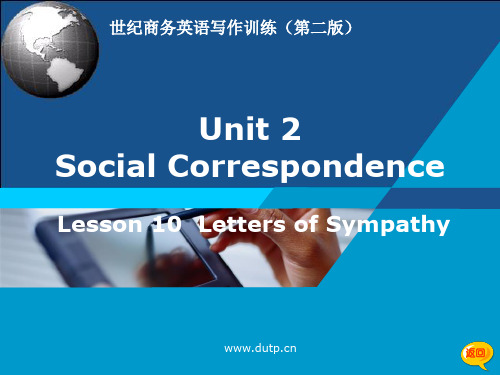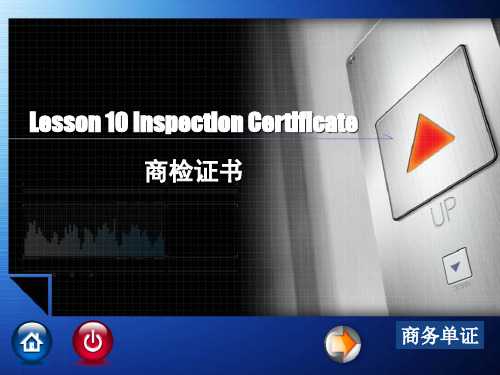国际商务英语课文电子版lesson (10)
商务英语综合教程(上册)Unit 10 Advertising It's Everywhere共54页

Text Exercises
Unit 10 Advertising: It's Everywhere
Related Technical Terms Grammar
Text
Unit 10 Advertising: It's Everywhere
1 No, it's not your imagination. The amount of
Text
Ambient advertising
Unit 10 Advertising: It's Everywhere
2 Ambient advertising refers to intrusive ads in public places. With the cost of traditional media advertising skyrocketing and a glut of ads fighting for consumers' attention, marketers are aggressively seeking out new advertising vehicles. Cars, bicycles, taxis and buses have become moving commercials. Ambient ads appear on store floors, at gas pumps, in washrooms stalls, on elevator
Unit 10 Advertising: It's Everywhere
Introduction
Advertising is marketing's most visible form of communication. The American Marketing Association (AMA) defines advertising as "any paid form of non-personal presentation and promotion of ideas, goods, or services by an identified sponsor.” Nonprofit and public organizations, individuals and businesses all use advertising to convey messages about their services, ideas and products.
商务英语10

10.2 Lending rate change to spur private sector
• China's decision to ease credit regulations is being widely perceived as a major step towards the creation of a capital environment capable of spurring investments in the nation's fund-strapped private sector. • Raising the upper limit for lending is also considered a major move towards a freer, more market-driven banking system.
Unit Ten Consumption and Investment
A Brief Introduction to This Unit
• Consumption, saving, and investment play an important role in a nation's economic performance. Generally, nations that consume most of their incomes have low investment in new plants and equipments, and show low rates of growth of productivity and wages, the other way around for nations that save and invest large fractions of their incomes.
《国际商务英语》(自考)Lesson 10

other risks
➢ political risks - war, quotas, foreign exchange control
➢ commercial risks - market change and exchange rate fluctuation
➢ language barriers
exporter
draft and the shipping document
bank
customer
importer’s bank
document will not be released to the importer until payment is affected
D/ P at sight
sales on this basis are usually paid for by periodic payment
the exporter must have sufficient financial strength to carry to cost of the goods until receiving payment
/
debtor /ˈdetə(r)/
debit /ˈdebɪt/
adj. 国内的 n. 状况 n. 汇款 n. 债务人 v. 将……记入 借方;n. 借方
financial standing standing n. 地位;级别;身份;名声
credit worthiness /ˈwɜːðinəs/ default /dɪˈfɔːlt/ ban /bæn/
fluctuation /ˌflʌktʃuˈeɪʃ(ə)n/
财务状况
资信可靠 状况
n. 违约 n./ v. 禁 止
国际商务英语函电lesson10资料

We look forward to your confirmation.
Yours faithfully,
stipulate
v. 规定 • The L/C stipulates direct shipment. • Correct the following sentence: The contract stipulates that the L/C will reach the seller one month before the shipment. • as stipulated 按照规定 • stipulation n. 规定
involve
v. 涉及;陷入 • As the amount involved is small, we suggest to pay by T/T. 由于涉及的金额小,我们建议用电汇支付。
• Your delay in shipment will undoubtedly involve us in great trouble.
installment
• n. 分期
- payment by installment 分期付款
- in … equal monthly installments 分· · · 月等量装运 • n. 安装 - The necessary equipments have been installed successfully.
for one’s file • 供某人存档 for one’s file
• 供某人考虑 for one’s consideration
• 供某人参考 for one’s reference for one’s information • 供某人检查 for one’s examination • 供某人详阅 for one’s perusal
lesson 10

SEC 4
SEC 5
马迪 2005年9月1日
SEC 6
返回
LOGO
Section 2
SEC 1
Sample Study
Sample 2 (1)
November 15, 2006 Mrs. Edith Hampton 4575 Village Drive Seattle, WA 98105-5032 Dear Mrs. Hampton: I was deeply saddened to learn of Frank’s death and I would like to express my sincere sympathy to you and your family on behalf of the senior management team here at Interconnect Corp. 惊悉弗兰克去世的消息不胜悲 哀,我代表Interconnect高层管 理人员向您及家人表示诚挚的 慰问。
Ma Ji excelled at performing new items reflecting real life. Apart from satire, he pioneered new items praising the new life and new heroes and heroines. In addition to performing traditional items he started writing and performing cross-talk comic dialogues such as Ode to Friendship, Storm on the State and Multistory Restaurant, and solo comic dialogues like The Universal-Brand Cigarette. In Five Officers Contend for Fame, he was joined by several other comedians. Ma Ji also set great store by theoretical research into Xiangsheng so as to make his creations more socially relevant. His books include Selected Xiangsheng by Ma Ji and An Informal Discussion on the Art of Xiangsheng.
国际商务英语课文电子版lesson(10)

国际商务英语课⽂电⼦版lesson(10)Lesson10 International Payment Generally speaking, it is not very difficult for buyers and sellers in domestic trade to get to know each other’s financial status and other information, and payment is likely to be made in a straightforward manner,say(for example)by remittance or by debiting the debtor’s account. In international trade, however, things are far more complicated. Purchase and sale of goods and services are carried out beyond national boundaries, which make it ratherdifficult for the parties concerned in the transaction to get adequate information about each other’s financial standing and creditworthiness (资信;信誉). Therefore, mutual trust is hard to build. Both the exporter and importer face risks as there is always the possibility that the other party may not fulfill the contract.For the exporter there is the risk of buyer default(不按期付款). The importer might fail to pay in full for the goods. He might go bankrupt.His government might, for various reasons, ban(禁⽌)trade with the exporting country or ban imports of certain commodities. The buyer might run into difficulties getting the foreign exchange to pay for the goods. It is even possible that the buyer is not reliable and simply refuses to pay the agreed amount on various excuses.On the part of the importer, there is the risk that the shipment will be delayed, and he might only receive them long after payment.The delay may be caused by problems in production or transportation, and such delays may lead to loss of business. There is also a risk that wrong goods might be sent as a result of negligence(疏忽⼤意)of the exporter or simply because of his lack of integrity (honesty).Political risks such as war, quotas, foreign exchange control; commercial risks like market change and exchange rate fluctuations(波动); and even language barriers all add upto(increase)the problems in international trade. Because of these problems and risks, exporters are hesitant to release their goods before receiving payment, while importers prefer to have control over the goods before parting with their money. Various methods of payment have been developed to cope with different situations in international trade. When the political and economic situation in the importing country makes payment uncertain or when the buyer’s credit standing isdubious (doubtful), the exporter may prefer cash in advance or partial cash in advance. In this case, the importer has no guarantee that the exporter will fulfill his obligations once he has made payment by cash. If the buyer and the seller know each other well, they may decide to trade on open account. This means that no documents are involved and that legally (in terms of law) the buyer can pay anytime. The seller loses all control over the goods once they have been shipped. Sales on thisbasis are usually paid for by periodic payment, and obviously the exporter must have sufficient financial strength经济实⼒to carry the cost of the goods until receiving payment. If the exporter wishes to retain(保留)title or ownership(所有权)to the goods, he can enter into consignment transactions. This means the exporter has to send his goods abroad and will not get payment until the goods are sold. If not sold, the goods can be shipped back. Therefore, this arrangementshould only be made with full understanding of the risks involved and is preferably to be limited to stable countries where the exporter has a trusted agent to look after his interest.A lot of international transactions are paid for by means of the draft(汇票), which, also referred to as the bill of exchange, is an unconditional(⽆条件的)order to a bank or a customer to pay a sum of money to someone on demand(⽴即)or at a fixed time in the future.The person who draws(开⽴)the draft,usually the exporter, is called the drawer(出票⼈), and the person to whom the draft is drawn is called the drawee(受票⼈). There is yet another party payee(收款⼈), i.e. the person receiving the payment, who and the drawer are generally but not necessarily the same person, as the drawer can instruct the drawee either to pay “to the order of ourselves” or to the order of someone else, for instance, the bank.A draft is either a sight draft ora usance draft (also called tenor draft or term draft). The former calls for (needs)immediate payment on presentation(提⽰) to the drawee while the latter is payable at a later date, e.g. 30, 45, 60, or 90 days after sight or date. A draft is either clean (clean draft 光票) (without documents) or documentary (documentary draft跟单汇票). In the latter case, the draft is accompanied (attached)by the relevant documents such as the bill of lading, the invoice, the insurance policy etc.In documentary collection ( 跟单托收), the exporter sends the draft and the shipping documents运输单据representing title tothe goods to his bank, which forwards (sends)them to another bank in the importer’s country, which in turn contacts the customer (importer). In the case of documents against payment (D/P)付款交单, documents will not be released to the importer until payment is effected执⾏. There are D/P at sight and D/P after sight. The former requires immediate paymentby the importer to get hold of the documents. The latter gives the importer a certain period after presentation of the documents, but documents are not released to him until he actually pays for the merchandise货物. In the case of documents against acceptance (D/A)承兑交单, documents are handed over to the importer upon his acceptance(承兑)of the bill of exchange drawn by the exporter. Payment will not be made until a later date. D/A is always after sight.So far as the exporter’s interest is concerned, D/P at sight is more favorable than D/P after sight, and D/P is more favorable than D/A. In actual trade, payment by collection should be accepted with discretion (⼩⼼). It is usually used when the financial standing of the importer is sound(良好的), or when the exporter wishes to push the sale of his goods, or when the transaction involves only a small quantity. Otherwise, the letter of credit is generally preferred.。
电子教案(PPT版本)]电子商务英语 (10)[14页]
![电子教案(PPT版本)]电子商务英语 (10)[14页]](https://img.taocdn.com/s3/m/0999bee283c4bb4cf6ecd10c.png)
Marketers with global goals are now establishing mirror sites and multiple-language versions of their Web sites. Internet translation tools are available that make this easier to do. It is only a matter of time until those marketers use their Web sites to accept and fulfill orders online from customers worldwide.
Developing global marketing partnerships. Internet marketing makes joint ventures attractive and easy to implement. A marketer can join together with one or more partners whose products or services complement the marketer’s products or services. Then members of this consortium can pool their resources. They can execute cooperative E-mail campaigns by sharing each other’s lists or form a collaborative Web site that features their solution set. They can also use their own extranets to speed communication with sales anipating companies throughout the world.
Lesson 10 Inspection Certificate 商检证书 世纪商务英语—函电与单证

LOGO
19) Place of Issue (签证地点) It is the place of issuing certificate and inspection.
理
方
结果合格
结果不合格
法
的
签发有关单证放行 签发有关单证放行 签发不合格通知单,不准出口
LOGO
进口报检程序:
单证不全,报检人补充材料
报 检 /申 报
检务审单
计收费
施检部门接单审单
条件不符,不受理报ຫໍສະໝຸດ ,退回 检务部门出具通关单现场查验
检验检疫部门接单
实施检验检疫
实验室检验检疫
出具检验检疫结果
结果合格
5) Name and Address of Consignee (收货人名称及地址) It should be the same as that in the L/C and relevant documents.
6) Description of Goods (品名) It should be the same as that in the L/C and relevant documents.
7) Place of Origin (产地) It should be the same as that in the L/C and relevant documents.
LOGO
8)Quantity Declared (报检数量) It should be the same as that in the L/C and relevant documents.
- 1、下载文档前请自行甄别文档内容的完整性,平台不提供额外的编辑、内容补充、找答案等附加服务。
- 2、"仅部分预览"的文档,不可在线预览部分如存在完整性等问题,可反馈申请退款(可完整预览的文档不适用该条件!)。
- 3、如文档侵犯您的权益,请联系客服反馈,我们会尽快为您处理(人工客服工作时间:9:00-18:30)。
Lesson10 International Payment Generally speaking, it is not very difficult for buyers and sellers in domestic trade to get to know each other’s financial status and other information, and payment is likely to be made in a straightforward manner, say(for example)by remittance or by debiting the debtor’s account. In international trade, however, things are far more complicated. Purchase and sale of goods and services are carried out beyond national boundaries, which make it ratherdifficult for the parties concerned in the transaction to get adequate information about each other’s financial standing and creditworthiness (资信;信誉). Therefore, mutual trust is hard to build. Both the exporter and importer face risks as there is always thenot fulfill the contract.For the exporter there is the risk of buyer default(不按期付款). The importer might fail to pay in full for the goods. He might go bankrupt.His government might, for various reasons, ban(禁止)trade with the exporting country or ban imports of certain commodities. The buyer might run into difficulties getting the foreign exchange to pay for the goods. It is even possible that the buyer is not reliable and simply refuses to pay the agreed amount on various excuses.On the part of the importer, there is the risk that the shipment will be delayed, and he might only receive them long after payment.The delay may be caused by problems in production or transportation, and such delays may lead to loss of business. There is also a risk that wrong goods might be sent as a result of negligence(疏忽大意)of the exporter or simply because of his lack of integrity (honesty).Political risks such as war, quotas, foreign exchange control; commercial risks like market change and exchange rate fluctuations(波动); and even language barriers all add upto(increase)the problems in international trade. Because of these problems and risks, exporters are hesitant to release their goods before receiving payment, while importers prefer to have control over the goods before parting with their money.Various methods of payment have been developed to cope with different situations in international trade. When the political and economic situation in the importing country makes payment uncertain or when the buyer’s credit standing isdubious (doubtful), the exporter may prefer cash in advance or partial cash in advance. In this case, the importer has no guarantee that the exporter will fulfill his obligations once he has made payment by cash. If the buyer and the seller know each other well, they may decide to trade on open account. This means that no documents are involved and that legally (in terms of law) the buyer can pay anytime. The seller loses all control over the goods once they have been shipped. Sales on thisbasis are usually paid for by periodic payment, and obviously the exporter must have sufficient financial strength经济实力to carry the cost of the goods until receiving payment. If the exporter wishes to retain(保留)title or ownership(所有权)to the goods, he can enter into consignment transactions. This means the exporter has to send his goods abroad and will not get payment until the goods are sold. If not sold, the goods can be shipped back. Therefore, this arrangementshould only be made with full understanding of the risks involved and is preferably to be limited to stable countries where the exporter has a trusted agent to look after his interest.A lot of international transactions are paid for by means of the draft(汇票), which, also referred to as the bill of exchange, is an unconditional(无条件的)order to a bank or a customer to pay a sum of money to someone on demand(立即)or at a fixed time in the future.The person who draws(开立)the draft,usually the exporter, is called the drawer(出票人), and the person to whom the draft is drawn is called the drawee(受票人). There is yet another party payee(收款人), i.e. the person receiving the payment, who and the drawer are generally but not necessarily the same person, as the drawer can instruct the drawee either to pay “to the order of ourselves” or to the order of someone else, for instance, the bank.A draft is either a sight draft ora usance draft (also called tenor draft or term draft). The former calls for (needs)immediate payment on presentation(提示) to the drawee while the latter is payable at a later date, e.g. 30, 45, 60, or 90 days after sight or date. A draft is either clean (clean draft 光票) (without documents) or documentary (documentary draft跟单汇票). In the latter case, the draft is accompanied (attached)by the relevant documents such as the bill of lading, the invoice, the insurance policy etc.In documentary collection ( 跟单托收), the exporter sends the draft and the shipping documents运输单据representing title to the goods to his bank, which forwards (sends)them to another bank in the importer’s country, which in turn contacts the customer (importer). In the case of documents against payment (D/P)付款交单, documents will not be released to the importer until payment is effected执行. There are D/P at sight and D/P after sight. The former requires immediate paymentby the importer to get hold of the documents. The latter gives the importer a certain period after presentation of the documents, but documents are not released to him until he actually pays for the merchandise货物. In the case of documents against acceptance (D/A)承兑交单, documents are handed over to the importer upon his acceptance(承兑)of the bill of exchange drawn by the exporter. Payment will not be made until a later date. D/A is always after sight.So far as the exporter’s interest is concerned, D/P at sight is more favorable than D/P after sight, and D/P is more favorable than D/A. In actual trade, payment by collection should be accepted with discretion (小心). It is usually used when the financial standing of the importer is sound(良好的), or when the exporter wishes to push the sale of his goods, or when the transaction involves only a small quantity. Otherwise, the letter of credit is generally preferred.。
